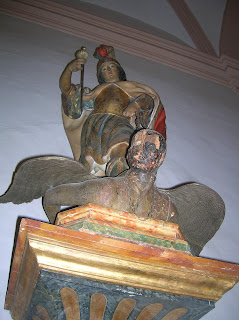This miserable
creature howling on the end of the chain is, I assume, Satan, or at least a
devil. His eyes are empty hollows and his face seems to have been damaged,
peeled. He is utterly anonymous, stripped naked, with not even a hair. Contempt
for him is shown in the cheap wood he is made of and in the thin, mocked-up
wings. Whichever saint is standing on his back is, by contrast, fully clothed,
coloured, rounded and larger, a person.
I found
myself near this sculpture while listening to a concert in a local church and found
myself looking at it repeatedly. While not exactly finding it distressing, I was
disturbed by its cruelty, and the fact that such an image could be thought
acceptable or even inspirational. Thank goodness most of us, both individually
and as societies, have moved beyond such superstition-fuelled hatred. Actually, not
thank goodness, thank – the development of rational thought since the
Enlightenment, principally I suppose.
The
sculpture made many different things spring into my mind – Blake’s famous
comment that Paradise Lost shows Milton
‘was of the Devil’s party without knowing it’; Blake’s own puzzling poem To the Accuser Who Is God of This World which begins ‘truly my Satan thou art but
a dunce’, and the witch in the musical Wicked – not wicked, but misunderstood.
I’ll finish
with a poem by John Agard:
On First-Name Terms
Hey. None of
this Beelzebub business.
Lighten up.
No more Prince of Darkness
and all that
Devil’s Advocate
kind of
stuff. I’m your mate.
It’s all
right to call me Dev
and I’ll
call you Les or Mags or Trev.
Formality
stinks. Don’t say evil. Say Ev.
© John Agard
from The Devil’s Pulpit (Bloodaxe
Books) via The Funny Side: 101 Humorous
Poems ed. Wendy Cope (Faber & Faber).

No comments:
Post a Comment